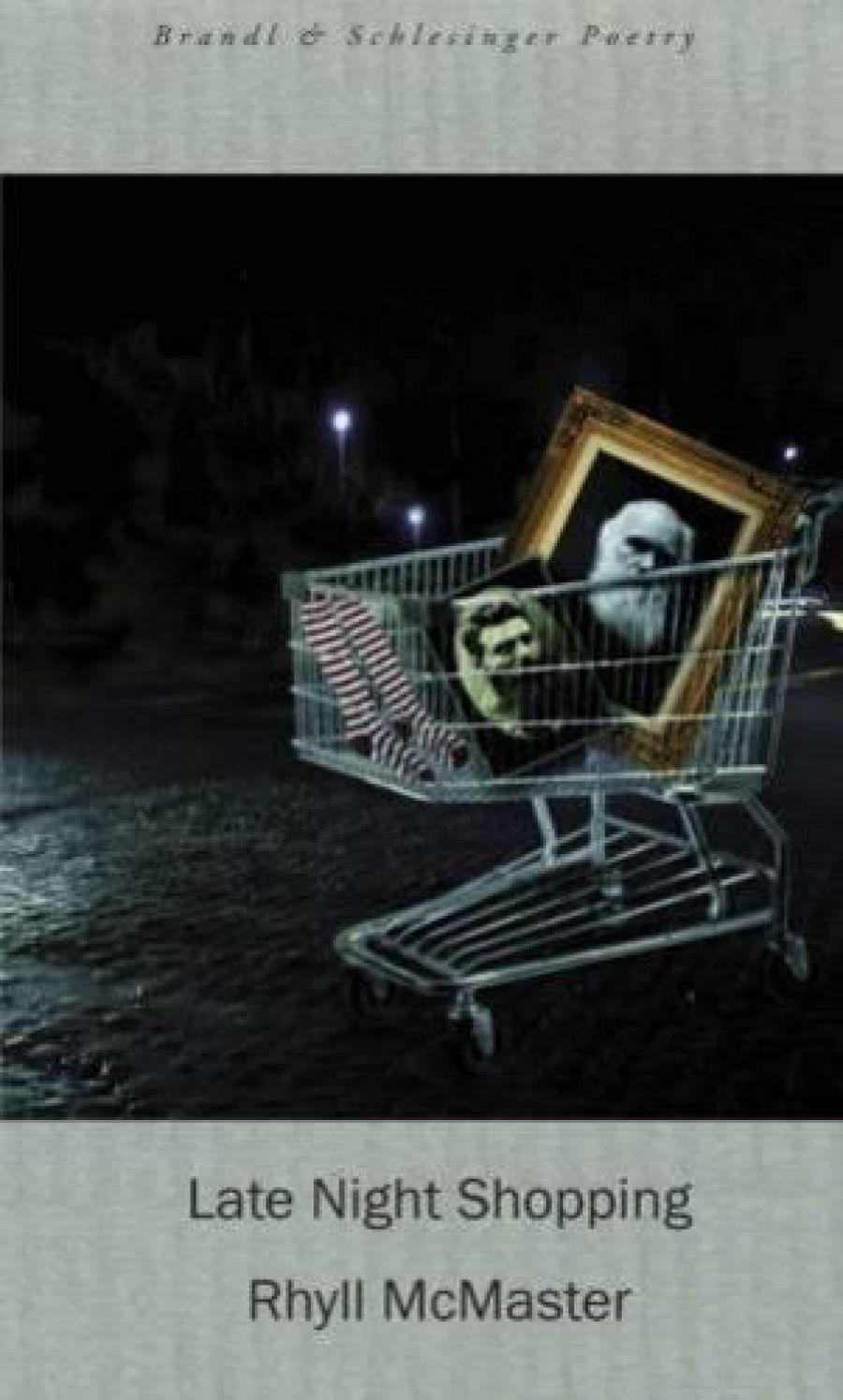
- Free Article: No
- Contents Category: Poetry
- Review Article: Yes
- Online Only: No
- Custom Highlight Text:
Broadly speaking, there are two types of epitaphs: those formulated by loved ones to describe the living qualities of the interred; and those that would presume to speak from the grave. Writers, ever reluctant to pass up a blank page – even if it is a tombstone – are disproportionate constituents of the latter ...
- Book 1 Title: Late Night Shopping
- Book 1 Biblio: Brandl & Schlesinger, $24.95 pb, 80 pp, 9781921556302
McMaster’s sixth collection of poems, Late Night Shopping, pursues a philosophical line of questioning present since her earliest work – ‘What is death?’ – and, trickier still, ‘What does it mean to be alive?’ The collection opens with a brilliant, if confronting, poem, ‘The Shell’, which describes a woman’s death in unflinching detail: ‘After that rasping second when the woman died / she was bleached pale on the surface like a sponge.’ When a nurse-aide touches the woman’s skin it is ‘leached fibrous’, her blood is ‘drained from the periphery / to pool centrally’ like ‘a rusting lake’. The woman’s ‘mere self’ is gone, ‘no longer atomically spinning’: she is ‘a hardening shell, a celluloid doll’. When the nurses try to slip her dentures in, they don’t fit. The poem concludes:
On edge, we laughed.
There was no disrespect – she wasn’t
there.
The formality of death is due to emptiness.When molecules cease their high
humming
dark space appears.
It radiates in waves and disperses in
continuous air.
McMaster’s struggle to wrap her mind around the idea of death not only informs her subject matter, but also delivers the fuel needed to get the poems running. In an elegy for her father, ‘His Ordered World’, the speaker looks around his empty workshop and puzzles that his hands were once alive on the now inert slide-rule. Death, she concludes, ‘senses fear of immensity’ and ‘invades the space / of serious human error where terror lives’.
McMaster has a habit of looking at the human body – dead or otherwise – and finding it unceasingly strange. In ‘Within Creation’, a poem from an earlier collection, the speaker studies her hands with esoteric detachment: ‘What are moons / on fingernails [...] what is your purpose in my life?’ Engaging the uncanny, she imagines a reply: ‘We make you wonder,’ the moons scream softly, ‘at our clean and / meaningless design’. In McMaster’s godless world, philosophy is no consolation: it is merely a game that stops us thinking of the roaring void of the universe, she argues elsewhere, and ‘of the image of the box / the inrush of gas / to the crematorium flame’.
McMaster’s poems are frequently informed by the latest findings in science – biology, genetics, physics, quantum mechanics – and metaphors of science are McMaster’s preferred methodology for creating awe. In ‘Re-Arrangement in the Emporium’ – a strange poem dedicated to Francis Crick, co-discoverer of DNA – McMaster contemplates the infinite convolutions of double-helix pairings (and flags her impressive skills as an imagist): ‘There will never be another / piece of furniture like me,’ the speaker asserts. The world is ‘a hall of settings,’ she continues, ‘rotating in limbic space’:
Head tucked over knees
we wheel and pulsate,
endless atoms
streaming from our heels.
Time and again, McMaster shows that, just as truth is sometimes stranger than fiction, science can be weirder than religion. In an ode to the human gene – ‘luminescent tors on the night road’ – McMaster returns her gaze to her hands. Hands, as anatomical structures, are replicated generation after generation, but they themselves ‘do not prevail’. Immortality through replication is the sole domain of the gene: ‘We have been here,’ the genes expound, ‘sinuous furrows on water / perhaps for ever’. Humans – our mind and body included – are servants to the longer processes of life. ‘You are our spoken word,’ the gene continues, ‘Through you, we are made manifest.’
It would be unfair to give the impression that Late Night Shopping is in its entirety a dark meditation on death. There are also daylight poems of love, art, and rural life, yet these poems function more like interludes than pinnacles. At her best, there is an attractive hard-headedness about McMaster. Her poems are a showcase for the mind at work – not just a person having thoughts, but someone really thinking. In a climate in which so many poets seem intent on dissembling meaning, it is a relief to find one intelligently engaged in its pursuit. McMaster knows too well there is no ‘reality’ – we are condemned to the mere wisps of data the senses can deliver to the brain – but her uncanny ability to describe such a state of unknowing puts her among the more interesting poets writing today. Late Night Shopping is, as they say in the poetry business, ‘a slim volume’: I only wish that, like life, it were a little longer.


Comments powered by CComment